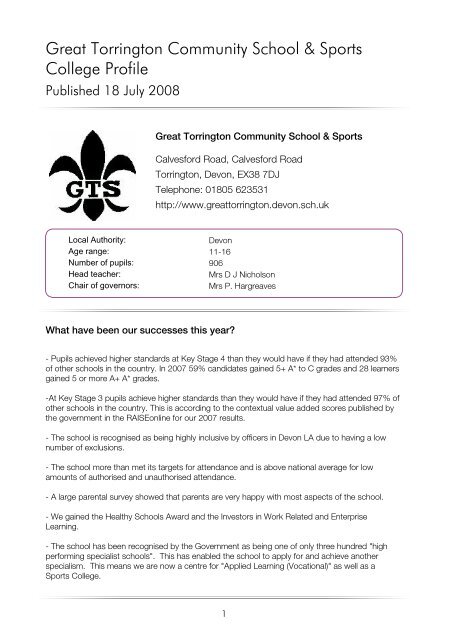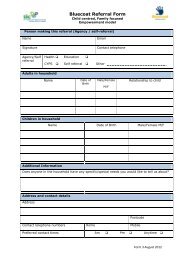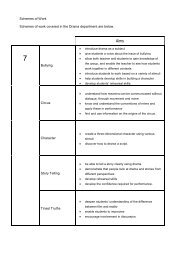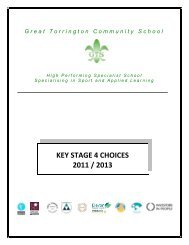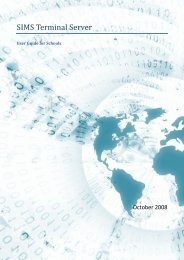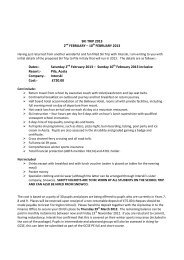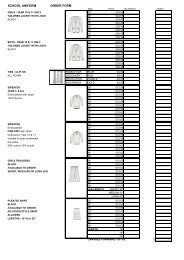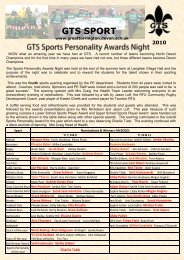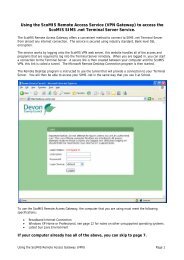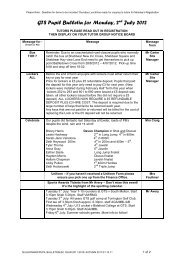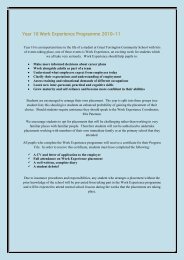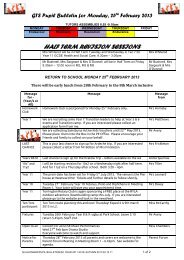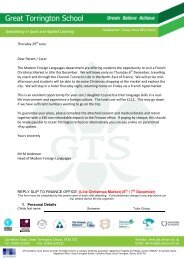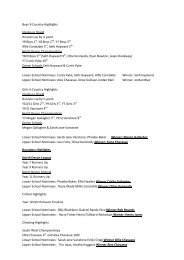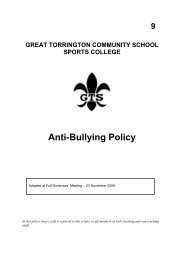Great Torrington Community School & Sports College Profile
Great Torrington Community School & Sports College Profile
Great Torrington Community School & Sports College Profile
Create successful ePaper yourself
Turn your PDF publications into a flip-book with our unique Google optimized e-Paper software.
<strong>Great</strong> <strong>Torrington</strong> <strong>Community</strong> <strong>School</strong> & <strong>Sports</strong><br />
<strong>College</strong> <strong>Profile</strong><br />
Published 18 July 2008<br />
<strong>Great</strong> <strong>Torrington</strong> <strong>Community</strong> <strong>School</strong> & <strong>Sports</strong><br />
Calvesford Road, Calvesford Road<br />
<strong>Torrington</strong>, Devon, EX38 7DJ<br />
Telephone: 01805 623531<br />
http://www.greattorrington.devon.sch.uk<br />
Local Authority:<br />
Devon<br />
Age range: 11-16<br />
Number of pupils: 906<br />
Head teacher:<br />
Mrs D J Nicholson<br />
Chair of governors:<br />
Mrs P. Hargreaves<br />
What have been our successes this year?<br />
- Pupils achieved higher standards at Key Stage 4 than they would have if they had attended 93%<br />
of other schools in the country. In 2007 59% candidates gained 5+ A* to C grades and 28 learners<br />
gained 5 or more A+ A* grades.<br />
-At Key Stage 3 pupils achieve higher standards than they would have if they had attended 97% of<br />
other schools in the country. This is according to the contextual value added scores published by<br />
the government in the RAISEonline for our 2007 results.<br />
- The school is recognised as being highly inclusive by officers in Devon LA due to having a low<br />
number of exclusions.<br />
- The school more than met its targets for attendance and is above national average for low<br />
amounts of authorised and unauthorised attendance.<br />
- A large parental survey showed that parents are very happy with most aspects of the school.<br />
- We gained the Healthy <strong>School</strong>s Award and the Investors in Work Related and Enterprise<br />
Learning.<br />
- The school has been recognised by the Government as being one of only three hundred "high<br />
performing specialist schools". This has enabled the school to apply for and achieve another<br />
specialism. This means we are now a centre for "Applied Learning (Vocational)" as well as a<br />
<strong>Sports</strong> <strong>College</strong>.<br />
1
What are we trying to improve?<br />
In 2008/9 we are trying to improve:<br />
1.By providing more personalised learning:<br />
we have increased our KS4 options from 13 to 31 including day courses at NDC.<br />
we have a nurture group for very low attaining Y7 & Y8 learners with more specialised<br />
teaching to suit the learners' needs and fewer teachers.<br />
through enrichment opportunities for more able learners to realise their potential with an<br />
express group for Y7 learners in 2008 to ensure that there is enough curriculum challenge<br />
for them.<br />
through specialist T.As who have been put in post to advise on learners with complex needs.<br />
2.We expect to see these SEN groups of learners achieving as well as the rest of the school<br />
population as shown in Raiseonline data in 2008 onwards.<br />
3.Learners' attitudes have been improved through setting up more school leadership opportunites<br />
for learners and the demand for more consistency in and outside the classroom. Our own data for<br />
sanctions should decrease and rewards should increase.<br />
4.Learners' expectations have also been improved through a system of assertive mentoring<br />
and teachers' efforts to improve homework. We expect to see less underachievement in the public<br />
exams for Y9 and Y11 in 2008.<br />
How much progress do pupils make between 11 and 16?<br />
Our <strong>School</strong><br />
Confidence interval<br />
The chart shows our school's contextual value<br />
added (CVA) score relative to that of other<br />
secondary schools. CVA is a statistical means of<br />
assessing how effective a school is, by measuring<br />
pupils' progress using their test and examination<br />
results. The confidence interval shows the range<br />
within which we can be confident the score<br />
(calculated on the results of only one year group)<br />
represents the overall effectiveness of a school. The<br />
percentile rank shows the percentage of schools<br />
with a score equal to or higher than ours.<br />
2
As can be seen in the graph above learners here have made much more progress than<br />
expected when they leave this school at 16 years old, and more progress than they would have<br />
made if they had attended most other schools. Pupils at this school have more value added to<br />
their learning from age 11 to 16 than in 93% of other schools. We are in the top 7% of the whole<br />
country. At key stage 4 relative attainment is significantly better than the national average.<br />
Progress measures from age 11 to 16 show that this school has been in the top 10% nationally for<br />
the last three years.<br />
How well do our pupils achieve at age 14?<br />
100<br />
90<br />
80<br />
70<br />
60<br />
50<br />
40<br />
30<br />
20<br />
10<br />
0<br />
This shows Key Stage 3 results for 2007. It shows<br />
the percentage of pupils eligible for KS3 tests<br />
(usually 14 year olds) who achieved or exceeded<br />
level 5.<br />
English Maths Science<br />
Our school Local schools (Local Authority) All schools<br />
In 2007 our contextual value added put us in the top3% nationally with English in the top 4%,<br />
Science in the top 7% and Mathematics the top 12% in comparison to all schools across the<br />
country. In Mathematics a high proportion of pupils gained level 6, level 7 and level 8 in<br />
comparison to other schools.<br />
In English 85% of pupils gained level 5 or above; in Maths and Science the figure was 84%<br />
We were happy with the teacher assessed results in all the other areas of the Key Stage 3<br />
curriculum.<br />
How well do our pupils achieve at age 16?<br />
100<br />
90<br />
80<br />
70<br />
60<br />
50<br />
40<br />
30<br />
20<br />
10<br />
0<br />
This shows the percentage of pupils<br />
(who were at the end of Key Stage 4)<br />
who in 2007 achieved 5 or more<br />
GCSEs (and equivalent) at grades A*-<br />
C, 5 or more GCSEs (and equivalent) at<br />
grades A*-C including English and<br />
mathematics GCSE, and one or more<br />
GCSEs (and equivalent) at grades A*-G.<br />
5+ GCSEs A*-C incl. English and Maths 1 or more passes<br />
Our school Local schools (Local Authority) All schools<br />
3
In 2007 59% of pupils gained 5 A* - C grades<br />
96% of pupils gained 5 A* - G grades<br />
One pupil gained the top mark in French out of 100,977 candidates<br />
One pupil gained a top five mark in English literature out of 364,832 candidates<br />
28 pupils gained 5 or more A*/A grades<br />
10 pupils gained 12 A* - C grades<br />
How have our results changed over time?<br />
In the last three years:<br />
At Key Stage 3 there has been a significant improvement especially in the tested Mathematics and<br />
Science. Pupils make considerably more progress than expected between Key Stage 2 to 3, and<br />
more pupils are gaining the higher levels each year.<br />
At Key Stage 4 the school is achieving better than expected results when compared to most other<br />
Devon <strong>Community</strong> schools and is considered to be making better than expected progress by the<br />
Local Authority.<br />
Pupils have made much more progress than expected in the five years that they attend this school<br />
i.e. from Key Stage 2 to 4. In 2007 our pupils made better progress than pupils in 93% of other<br />
schools. Able pupils have gained considerably more higher grades at GCSE each year.<br />
How are we making sure that every child gets teaching to meet their individual<br />
needs?<br />
With an emphasis on assessment for learning and the National Strategy, individual pupil attainment<br />
has been raised. We have made better use of assessment data and marking to recognise pupil<br />
progress or lack of it. All pupils have targets based initially on their KS2 results. We have developed<br />
a system, in which all pupils are assessed across all subjects once each term and parents are<br />
informed about progress<br />
Teachers differentiate their teaching by input or outcome to suit the needs of each individual,<br />
similarly homework is sometimes differentiated.<br />
In the Autumn term of Y10, pupils have minimal and aspirational targets for each GCSE subject<br />
based on their KS3 results and the national graphs in RAISEonline.<br />
There is a mixture of pupil grouping arrangements depending on the demands of the subject being<br />
taught. Pupils are grouped in whatever way best ensures that the teacher can cater for the<br />
individual needs of the pupils. Teaching groups are mostly mixed ability in Y7. Setting, based on a<br />
4
pupil's ability in that subject, increases as pupils move up the school.<br />
Teachers are encouraged to use formative marking whenever possible in order to ensure that a<br />
pupil knows what to do to improve.<br />
How do we make sure all pupils attend their lessons and behave well?<br />
Attendance is monitored through two formal group registrations: one is first thing in the morning<br />
and the other is after lunch. It is school policy that teachers take a register at the start of each<br />
lesson to ensure attendance in lessons. If a pupil is absent from a lesson and was present at<br />
registration, this will be reported to Reception and if the pupil cannot be located then the parents<br />
will be informed.<br />
High standards in pupil behaviour are enforced by all staff. Consistency is achieved through an<br />
agreed policy, which includes rewards and sanctions. Our Behaviour policy is reviewed regularly<br />
and annual data on rewards and sanctions is analysed in order to monitor changes. Behaviour in<br />
this school is considered to be very good ( see Ofsted report 2006). A variety of strategies are<br />
used to reduce bullying. Learners tell us that they feel safe in this school.<br />
What have pupils told us about the school, and what have we done as a<br />
result?<br />
Learners monitor and evaluate the canteen through a Food User group.<br />
Learners have Year and <strong>School</strong> Councils, through which they consider all aspects of the school<br />
e.g. this year learners have given their views on what makes a good lesson, and these responses<br />
have been passed to the teaching staff. Some of these Council representatives have volunteered<br />
to form a premises committee to monitor the new build and choose colour schemes etc<br />
Homework reviews are undertaken each term and pupils are asked to comment on various aspects<br />
of the quality of the homework set, and teachers have improved their use of homework in response<br />
to these comments<br />
Teaching staff have been encouraged to gain evaluations of their teaching from pupils as part of<br />
their self evaluation process.<br />
<strong>School</strong> Leaders (Prefects) volunteer or are nominated and then they are interviewed for their roles;<br />
they receive leadership training. <strong>School</strong> Leaders report on any problems and suggest<br />
improvements.<br />
5
How are we working with parents and the community?<br />
We aim to develop a close partnership with parents as soon as their child enters the school, and<br />
before through induction arrangements. The child's tutor is the key contact for parents. They meet<br />
each year at the Tutor evenings and at other times as required. Parents are invited to contact the<br />
Tutor whenever they have concerns.<br />
All Parents are also invited to the Award ceremonies, Careers events, Open evenings, <strong>Sports</strong><br />
events etc.<br />
Pupils take part in a number of community activities e.g. festivals in the town, drama in our feeder<br />
schools and art exhibitions.<br />
Members of the community are invited to fundraising events organised by our very active Parents<br />
and Friends Association. We ensure that our events are reported in the local press.<br />
The school has a strong link with the local Rotary Club through presentations, copies of our half<br />
term newsletter and termly visits to school by the rotarian responsible for international links.<br />
Learners with staff attend the termly Care Forum in the town.<br />
There are many links with local sports clubs.<br />
What activities and options are available to pupils?<br />
A great variety of activities are available to pupils, as well as sport there are concerts at Christmas<br />
and in the Summer, a drama production in school and a dance production at the Plough in May.<br />
We also have a full programme of extra curricular sport.<br />
Study provision is available in the library before and after school as well as at lunchtime. A<br />
computer room is avaiable at lunchtime as well as after school when the Homework club is based<br />
there for an hour. There are weekly after school activities i.e. cooking, film making, and beauty as<br />
part of our childcare programme. On a day to day basis there are a range of activities at lunchtime.<br />
There were many day trips throughout the year,arranged by most subjects to enrich the curriculum.<br />
Residential experience was gained through a week's skiing in Italy, a french exchange and water<br />
sports in France.<br />
A number of pupils took part in the Duke of Edinburgh award scheme and the Ten Tors challenge.<br />
All pupils in school choose from a wide selection of mostly sporting activities for two full Activities<br />
days as well as taking part in the competitive athletics events on <strong>Sports</strong> Day.<br />
We offer 31 different options for KS4 including three languages.<br />
6
How do our absence rates compare with other schools?<br />
20<br />
15<br />
10<br />
5<br />
This chart shows the percentage of half<br />
days missed through authorised and<br />
unauthorised absence by all pupils at the<br />
school. Information is given for the school,<br />
for schools within the local authority and<br />
for all schools.<br />
0<br />
2004/2005 2005/2006 2006/2007<br />
Our school Local schools (Local Authority) All schools<br />
The chart shows that our absence totals for all the pupils in this school are lower than all local and<br />
other schools. This means that we have excellent attendance totals as recognised by Ofsted in<br />
2006. We believe that this is because pupils enjoy coming to this school.<br />
How do we make sure our pupils are healthy, safe and well-supported?<br />
We are a <strong>Sports</strong> <strong>College</strong> and this means that we have extra resources to give pupils many more<br />
opportunities to be healthier through sport and exercise. The timetabled curriculum, which<br />
contains four hours of P.E. lessons per fortnight in Year 7, and five hours in all other years.<br />
There are also many extra curricular sessions available covering a wide range of activities. Healthier<br />
meal options are encouraged in the canteen and from the vending machines.<br />
Learners are kept safe through a vigilant Health and Safety policy, which is closely monitored by the<br />
staff and governors.<br />
Child Protection procedures are regularly reviewed and the staff are annually updated through<br />
further training.<br />
All pupils are supported through a highly effective Year System where tutors and Year Heads are<br />
the main points of contact. Many outside agencies are utilised when their expertise is needed to<br />
support individual learners and to support the teaching of social, legal, economic and health<br />
issues.<br />
In October 2006 Ofsted graded the pupils' healthy lifestyles as excellent. In 2008 the school<br />
gained the Healthy <strong>School</strong>s award.<br />
7
What do our pupils do after year 11?<br />
According to data from Connexions 91.26% of the Y11 cohort, who left this school in Summer<br />
2007, stayed in education and training; 2% were unemployed.<br />
Ofsted’s view of our school<br />
<strong>Great</strong> <strong>Torrington</strong> <strong>Community</strong> <strong>School</strong> and <strong>Sports</strong> <strong>College</strong> is a good school. High expectations and a<br />
strong focus on learning ensure pupils achieve well. Pupils enjoy coming to school, which is<br />
demonstrated by their outstanding attendance and positive behaviour. The school's work as a<br />
specialist sports college is very effective in promoting pupils' health and fitness and developing their<br />
self-esteem. They learn to take responsibility and many participate in the extensive range of clubs<br />
and sporting activities. As one appreciative pupil commented, 'You achieve your potential and grow<br />
here'.<br />
The curriculum is broad and provides for a wide range of capabilities and interests. The school<br />
works well with external partners, both to enrich the curriculum and to provide a high level of care,<br />
guidance and support for pupils. The high quality of teaching ensures pupils make good progress<br />
and achieve standards which are better than average. This is demonstrated by the consistently<br />
good results pupils gain in examinations. Arrangements for setting learning targets and checking on<br />
pupils' progress are generally very good and are a significant factor in raising standards. Pupils with<br />
LDD make satisfactory progress overall. Pupils at Key Stage 3 have made good progress in recent<br />
years. The learning targets of some pupils with LDD are not used to inform planning in all lessons<br />
and support is not always closely matched to their needs.<br />
The large majority of parents are happy with the school. They are particularly pleased with how new<br />
pupils are welcomed in Year 7. This view is summed up by one parent who wrote, 'My daughter<br />
has settled well. She enjoys getting up in the morning and going to school, and comes home<br />
feeling good about her work'. A very small number of parents have concerns about pupils'<br />
behaviour. Inspection evidence suggests pupils behave well, both in lessons and around the<br />
school. Pupils report that they can approach a member of staff if they have a problem and that any<br />
incidents of bullying are dealt with quickly. The school seeks to involve parents through regular<br />
open evenings and by conducting surveys of their views. A few parents feel that the school does<br />
not take sufficient account of their views and suggestions, particularly in relation to the school's<br />
rules regarding uniform.<br />
The headteacher and senior management team provide good leadership. They have tackled very<br />
effectively issues identified for improvement in the last inspection report. A clear focus on improving<br />
teaching and learning has ensured standards have risen each year. The monitoring of teaching is<br />
well established, although arrangements for identifying features of the very best lessons and for<br />
extending them across the school are underdeveloped. The accommodation has been improved<br />
significantly since the previous inspection. Some parts of the building are cramped and require<br />
continual maintenance, although plans are in place to rebuild these areas. The school uses<br />
resources well and provides good value for money. The strength of leadership and quality of<br />
teaching mean the school is well placed for further improvement.<br />
Date of last inspection: 05-Oct-2006<br />
Ofsted graded our school as good<br />
Inspectors made judgements on a scale: outstanding (grade 1); good (2);<br />
satisfactory (3); inadequate (4).<br />
View the Ofsted page for <strong>Great</strong> <strong>Torrington</strong> <strong>Community</strong> <strong>School</strong> & <strong>Sports</strong><br />
8
What have we done in response to Ofsted?<br />
The school has responded to Ofsted by reviewing our provision for learners with special needs<br />
(LDD). We have introduced a responsibility structure for the teaching assistants in order to gain<br />
more expertise within the school for pupils with complex needs; this expertise will support<br />
teachers and enabled them to plan more effectively for the learning needs of these learners. We<br />
have extended the target setting system to include learners on the lowest and P levels.<br />
Teaching staff have been encouraged to share good teaching practice in a variety of ways.<br />
More Information<br />
If you would like more information about school policies, including our policies on special<br />
educational needs and disability, admissions, finance, school food and our complaints procedure,<br />
please contact us:<br />
By telephone 01805 623531<br />
Our website http://www.greattorrington.devon.sch.uk<br />
9


